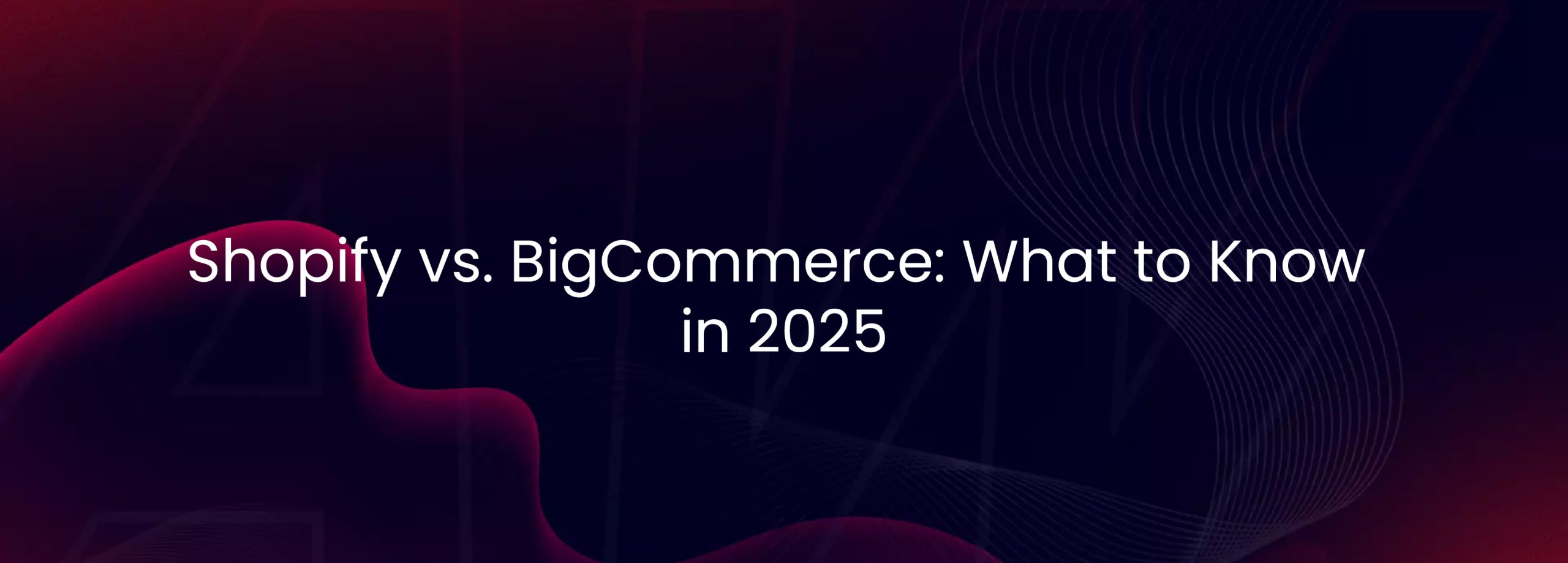
As e-commerce dominates the global marketplace, it is more important than ever to choose the right platform for building your online store. Some popular and reliable solutions for different business sizes are Shopify and BigCommerce. Being one of the most scalable products, both websites have remarkable strengths and robust features, while their differences are what affect the success of your business venture.
Here’s what you ought to know regarding Shopify and BigCommerce while entering the year 2025:
Understanding Shopify and BigCommerce
Shopify and BigCommerce are the most popular e-commerce platforms that allow businesses to set up online stores that can be tailored and saved without requiring technical skills.
Shopify was founded in 2006 to provide easy use, a wide app store, and unlimited scalability. On the other hand, BigCommerce was founded in 2009 with more features, a built-in set of features, and extreme customization options that have more capabilities geared toward the technologically savvy user.
Despite their similarities, each platform still has unique strengths and weaknesses that are important to remember based on your business requirements and growth path.
Ease of Use: Shopify Takes the Lead
Shopify is very popular among new entrepreneurs who have little technical knowledge because of its user-friendly features. This way, it is easy to set up, design, and manage a store in Shopify. Shopfiy’s drag-and-drop builder means users create fantastic storefronts without the need to write a single line of code.
BigCommerce is also easy to handle but appears to be designed more for advanced users who could have some background in web development. Being a highly powerful platform, it has a learning curve that sometimes can’t be overcome by everyone, particularly for beginners. If one needs simplicity and speed to launch a store, the winner is definitely Shopify.
Customization and Flexibility: BigCommerce’s Strength
When it comes to customization, BigCommerce really shines with robust in-built tools and functionality. The users have the ability to be more flexible with their design and fine-tune their stores without having to rely heavily on third-party apps. Moreover, it offers unlimited product options and variations, perfect for business owners with a complex catalog.
Although very flexible, Shopify often needs third-party apps to implement features or functionality. This might be a weakness, but it’s also an opportunity for businesses to customize their store and get the exact integrations they need.
Scalability and Performance
in 2025, scalability is an essential aspect of e-commerce business performance, and both Shopify and BigCommerce perform strongly on this criterion.
Shopify is built to scale with your business, with enterprise-level solutions in Shopify Plus. This is for the high-volume merchant, so it has more advanced performance, analytics, and dedicated support.
BigCommerce also offers its Enterprise plan, which caters to large-scale activities. Its no-additional-transaction-fee policy offers an added cost advantage for higher sales volumes.
Pricing and Transaction Fees
Most businesses use an e-commerce platform because of its pricing. Shopify has a tiered pricing plan from Basic Shopify up to Advanced Shopify. Their monthly pricing is set at $29 to $299. Nonetheless, Shopify also charges fees on each transaction for merchants using any payment gateway other than Shopify Payments.
BigCommerce eliminates transaction fees altogether, no matter which payment gateway one uses. Its plans range from $29.95 to $299.95. Although the prices are at par with Shopify, it is more cost-effective since there are no transaction fees for businesses that sell millions or those using third-party payment solutions.
SEO and Marketing Features
Search engine optimization (SEO) is the most crucial element to drive organic traffic into your online store. In 2025, both Shopify and BigCommerce will offer competitive SEO tools, but they cater to slightly different needs.
BigCommerce offers advanced SEO in a box, including customizable URLs, meta descriptions, and rich snippets. These features help technically more adept users optimize the store for search engines more easily.
Shopify’s SEO tools are a bit more streamlined, making them easy to use for beginners. In addition, integration with third-party apps, such as Plug-in SEO and Yoast, would be effortless to improve further optimization efforts. Email marketing, social media integrations, and abandoned cart recovery tools all contribute to an effective reach of the market by Shopify’s marketing ecosystem.
Integrations and App Ecosystem
Shopify is widely celebrated for its extensive app store, which boasts thousands of integrations for inventory management, email marketing, accounting, and more. These apps make it possible for users to expand their store’s functionality with minimal effort.
BigCommerce offers fewer third-party apps but compensates by providing many essential features built into the platform itself. For businesses looking to minimize reliance on external integrations, BigCommerce’s all-in-one approach can be a significant advantage.
Support and Resources
Both Shopify and BigCommerce have great support for users, making running stores on either platform much easier. Shopify provides its users with 24/7 phone support along with live chat and email support, in addition to a comprehensive knowledge base, which is further supplemented by active community forums.
BigCommerce matches Shopify’s support offerings but also emphasizes hands-on assistance for users during the onboarding process. This makes it an attractive choice for businesses seeking guidance while setting up their store.
Conclusion
As e-commerce continues its trend in 2025, Shopify and BigCommerce continue to be reliable, as they have been previously, for businesses looking to either establish or expand online. The choice between the two rests squarely on your business goals, technical skills, and your budget.
Shopify shines because of its ease of use, scalability, and rich app ecosystem for entrepreneurs and small businesses, but BigCommerce is ideal for bigger companies or complex catalog enterprises because of the presence of more powerful in-built tools.
With the capability to support the latest trends in e-commerce, you can be sure of getting the right platform, regardless of which one you choose between these two.
Ready to take your e-commerce strategy to the next level? Contact American Web Builders today for expert guidance on building your dream online store with Shopify, BigCommerce, or other leading platforms. Let us help you unlock your business’s full potential in 2025 and beyond.
Ready to Elevate Your Brand?
Create a powerful brand identity and
web design that reflects your aspirations.
Fuel Your Brand’s
Prosperity with
Captivating Logo Designs
Explore the full spectrum of innovative design. Our specialists
are dedicated to transforming your brand from a memorable
logo and an intuitive web design to professional
stationery, seamless e-commerce integration, and a
cutting-edge mobile application.
We Are Here To Help
Skyrocket Your
Business’s Meteoric
Rise with the Experts
Launch your company into the stratosphere! American Logo
Developers’ skilled staff is here to help propel your brand.
Take a chance and shoot
for the moon today.
Providing Industries with Innovative,
Tailored Solutions to Transform Success Across USA & Canada
- Arlington
- Cleveland
- Jacksonville
- Miami
- Orlando
- Atlanta
- Dallas
- Louisville
- Minneapolis
- Philadelphia
- Austin
- Denver
- Kansas City
- New York
- Portland
- Chicago
- Houston
- Los Angeles
- New Orleans
- San Diego




























